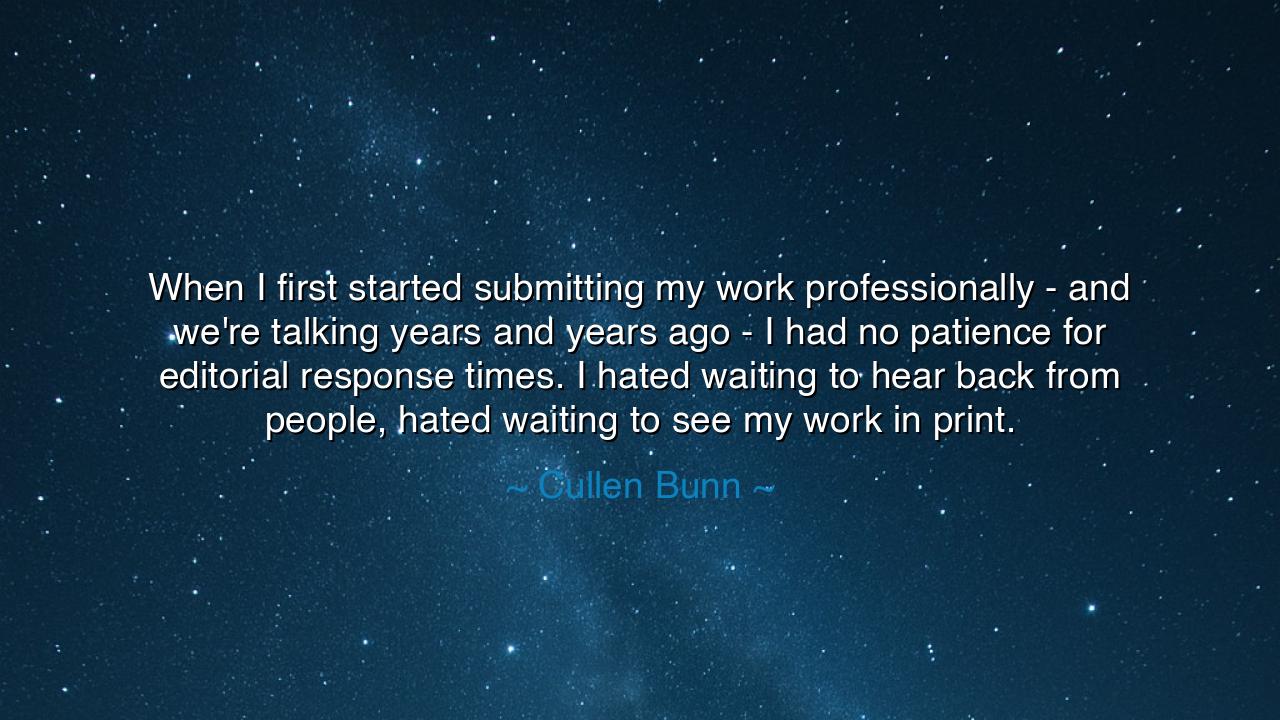
When I first started submitting my work professionally - and
When I first started submitting my work professionally - and we're talking years and years ago - I had no patience for editorial response times. I hated waiting to hear back from people, hated waiting to see my work in print.






In the words of Cullen Bunn, storyteller and weaver of worlds, there is confessed a truth that burns in the heart of every creator: “When I first started submitting my work professionally—and we’re talking years and years ago—I had no patience for editorial response times. I hated waiting to hear back from people, hated waiting to see my work in print.” These words reveal not only the struggle of one writer, but the eternal trial faced by all who birth creations into the world—the trial of waiting between the act of creation and the moment of recognition.
For what is the act of waiting, if not a crucible of the soul? The creator, aflame with passion, desires to see their work take form in the world, to know if it has been accepted, if it will live beyond the silence of their desk. Yet the world does not move at the speed of inspiration. The gatekeepers of art—editors, publishers, critics—take their time, weighing and judging, while the heart of the artist trembles in impatience. Bunn confesses honestly what all know in secret: that this waiting is harder to endure than the labor of creation itself.
History offers us countless mirrors of this truth. Consider the story of Herman Melville, who poured his very soul into Moby-Dick. When he released it, he waited for acclaim that never came in his lifetime. His masterpiece, now hailed as one of the greatest novels ever written, languished in obscurity, and the silence of the world wounded him deeply. It was not the act of writing that crushed him, but the long, unyielding waiting for recognition that never arrived. In his story, as in Bunn’s confession, we see the agony that comes when time itself becomes the artist’s enemy.
Yet from this trial arises wisdom. To endure waiting is to be tested in patience, and patience, though bitter at first, becomes a source of strength. The oak does not spring to its height in a day, nor does a river carve its canyon in a year. Creation itself is patient, and so must the creator be. Bunn’s words, though spoken as frustration, also reveal the lesson he has since learned: that the writer must cultivate patience as surely as skill, for without it, bitterness will poison the joy of making.
The meaning of this quote is therefore twofold: it speaks of the impatience natural to the human heart, and of the necessity of transforming that impatience into endurance. The artist cannot control the pace of the world’s response, but he can control his devotion to the craft. To hate waiting is natural; to master waiting is noble. Bunn’s honesty shows the raw humanity of the artist, while his persistence in continuing to write shows the discipline that overcame his early frustration.
The lesson for us is clear: when you create—be it story, song, business, or invention—do not measure your worth by how quickly the world responds. The silence of delay does not diminish the value of your labor. Patience is not weakness but strength, the proof that you are willing to endure the slow turning of fortune’s wheel. Guard your heart against despair in these moments, and use the time to refine your craft, so that when recognition does come, you are prepared for it.
So let the words of Cullen Bunn be remembered: the waiting will come, and it will test you. But do not let impatience wither your spirit. Instead, make patience your companion, perseverance your guide, and faith in your work your anchor. For though the world may be slow to answer, the worth of your creation is not diminished by delay, and the one who endures will, in time, see their work take root and live beyond them.






AAdministratorAdministrator
Welcome, honored guests. Please leave a comment, we will respond soon